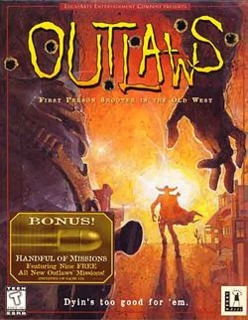Outlaws has all the necessary ingredients to become an instant classic, specially its perfect cinematic atmosphere.
Outlaws has all the necessary ingredients to become an instant classic. It has a somewhat commonplace but cleverly developed and integrated plot, and it has a perfect immersing atmosphere. Let's begin with the plot. You incarnate Marshal James Anderson, a former sheriff that was forced to retire after being prosecuted for shooting someone. You live in peace with your wife and daughter in your humble ranch without upsetting anyone. But trouble shows up in the shape of an unscrupulous contractor that wants to bring the railway (his) to the land, by ways of corruption and Mafia-like persuasion. Apparently, the only guy who refused to surrender his home to this evil contractor was you; and since then, despite you didn't know it, you became a man marked for retaliation. And retaliation came one day, when you went out of your ranch to do the shopping. The evil guys came, killed your wife, kidnap your daughter, and set the house on fire. Once aware of what happened, you put your hat on, load your guns, ride your horse, and start the manhunt.
As you can see, Outlaws has a hell of a plot: notice how many lines it took me to tell you its plot and compare it to Doom's one up above. But that is only the beginning, because the plot develops and grows deeper and deeper. Plot is narrated and developed by the cinematic cuts at the intro, the ending, and between levels. Some of them are really long —the intro, for example, lasts 10 minutes! The cinematic cuts are of an incredible high quality, hand-drawn (you can even see the strokes of the pen) and very smoothly animated. Everyone of them interconnect very cleverly each level with the next one, and some of them tell interesting things about the past of Marshal James Anderson...
The atmosphere is as brilliant as the cinematics. People speak with the Texan dialect that nineteenth-century cowboys are supposed to have had, and every weapon, setting and decoration is adequate. Your flashlight feature, for example, is an oil lamp that must be refilled after the oil is consumed. The levels have the classical settings of every western movie: the town, the mine, the canyon, the warehouse. The best of all the levels is the third one, where you are in the middle of a moving train and you must get to the locomotive to stop it. But the best part of the atmosphere is the music. Although it was composed ad hoc by LucasArts' main musician, Clint Bajakian, finishing the intro is enough for you to feel that you are not playing any game at all, but watching one of those spaghetti westerns by Sergio Leone starring Clint Eastwood and scored by Ennio Morricone (as a matter of fact, the difficulty levels in which you may choose to play this game are called The Good, The Bad, and The Ugly).
But this game is not only cinematics. The level design is brilliant. Levels are huge, and they are full of evil guys to kill and clever puzzles to resolve. One thing to praise about them is the level of realism. Evil guys will duck or cover behind a column. If you shoot a bullet in order to hit someone at the other end of the screen, you will have to aim a little bit higher in order to compensate the gravity action (yes, bullets fall; they don't travel miles in a straight line). If they hit an object like the ground or a kettle, the object reacts realistically to the impact. Levels are finished not by pushing a button on the wall, but actually killing on a duel one boss of the band of the evil rail contractor. Although you can carry a huge amount of ammo, your weapons behave realistically: you can't simply put 200 bullets on your pistol and shoot them in a row. You must load only 12 at a time, and you must reload your pistol after the clip is completely shot. And reloading takes time: you character must actually open the weapon and load a bullet, a shell at a time. And, if you're playing in higher levels of difficulty, one accurate shot from the enemy is enough to kill you, even if you have your health at maximum. Just like real life. This level of realism is a standard for shooters nowadays, sure; but this wasn't true on 1996.
Outlaws also has replayability value. Playing the game in a higher difficulty level doesn't only increase the overall realism of the game or the bad attitude of the foes. It also increase the amount of puzzles you must solve in order to beat the level. A key that on a easier difficulty could be found in the middle of the street, on a higher level could be well hidden and you would be forced to resolve a lot of puzzles before you can reach it. And the game doesn't have only one single player feature. It has two. After you finish the main campaign by rescuing your daughter, you can try the Historical Scenarios feature. This is like another campaign, but harder. On it, you must complete a series of levels in no particular order, where you must terminate some famous criminals in order to climb ranks until you reach the Sheriff star. The problem is that Historical Scenarios adds civilians, and you cannot let them die on a skirmish. Kill yourself one civilian, and it's over for you.
What are you waiting for? This game is really a gem, no matter from where you look at it; and the recent Activision's Gun doesn't have anything to envy LucasArts' Outlaws. Get it, and enjoy!!!

